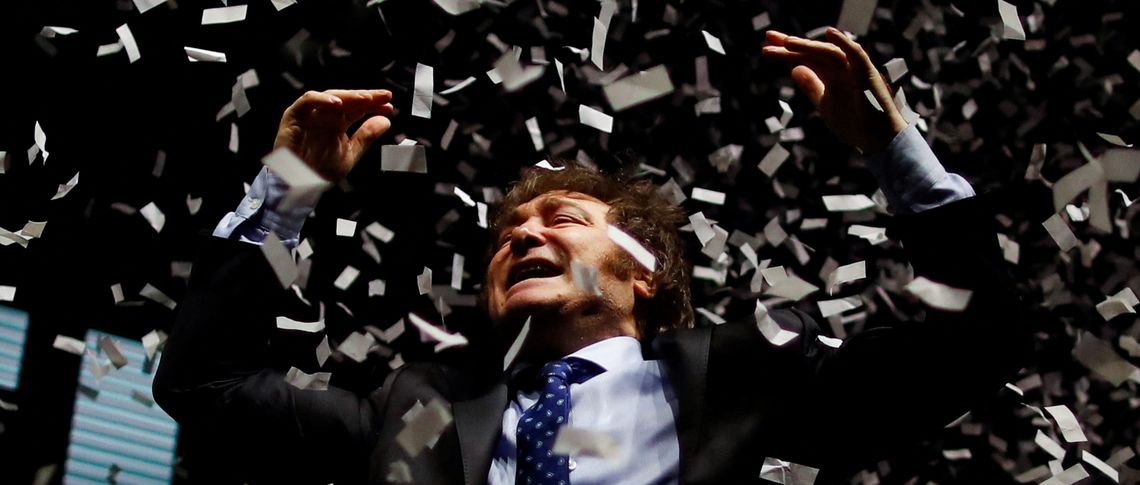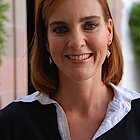Javier Milei makes headlines wherever he goes. The World Economic Forum in Davos was no exception. Socialism, he explained, poses a clear and present danger to the West. That includes feminism, devised by socialists to expand parasitic bureaucracy even further. Social justice is ‘intrinsically … unjust because the state is financed through tax and taxes are collected coercively’. Entrepreneurs are the true heroes of freedom today. At least some of these entrepreneurs must have rubbed their eyes in disbelief.
But the new president of Argentina is not merely an effective populist orator — he really means it. Milei is a self-styled libertarian. In Europe, this is considered a fringe doctrine, but in crisis-ridden Latin America, it has long been socially acceptable — and now it has seized power. But what and who lie behind it?
‘The rift’
Milei’s first measures upon taking office offer a clue. The Argentine parliament is currently debating his Necessity and Urgency Decree. It comprises 351 pages and would amend or abolish over 300 laws. It’s the centrepiece of the shock therapy that Milei imagines will turn Argentina around and make it one of the leading industrialised countries. But there’s scarcely anything new in this. Milei is merely caught up by the same brutal pendulum that has long plagued Argentina. The country lacks a basic social consensus. Argentinians call this ‘la grieta’ or ‘the rift’. When neoliberalism crashed in the 1990s, it was succeeded by state capitalism, which also failed — now, the pendulum has swung back towards neo-libertarianism, which melds neoliberal nostrums into authoritarianism.
Privatisation is one of the obsolete neoliberal doctrines that Milei is trying to breathe life into, regardless of whether the target company is loss-making or profitable. The companies in his sights include the biggest Argentinian airline Aerolíneas Argentinas, nuclear power stations, banks, ports, the news agency Télam, water company AYSA and the railways. The case of oil company YPF is emblematic in this respect. It was once state-owned, was privatised under the right-wing Peronist Carlos Menem and then renationalised by the left-wing Peronist Cristina Kirchner in 2012. As a result, international investors are still pursuing arbitration proceedings against Argentina. And now, YPF is set to be privatised yet again.
Milei’s decree also paves the way for undermining environmental protection measures. Super-rich tax avoiders are to be enticed to transfer their profits back to Argentina. State employees, by contrast, are to be laid off in tandem with the centralisation of power. In the future, for example, the president will decide on pension increases, not Argentina’s National Congress.
Milei’s decree provides for a curtailment of the rights to strike and demonstrate. Welfare recipients who stand up to the government are threatened with benefit cuts.
The neoliberals of the 1980s and 1990s were already on board with this, including the Iron Lady Margaret Thatcher, Chilean dictator Augusto Pinochet and Argentina’s former President Menem. They regarded the state as an inefficient, corruption-ridden scourge that they needed to shrink while glorifying individual (corporate) freedom and thwarting what they styled ‘communist’ economic models and ways of life (including cooperatives and the commons of indigenous people). All three are now dead, but their corpses have been revived, most recently by the hapless Liz Truss in the United Kingdom, Donald Trump in the United States and now by the ‘human chainsaw’ Milei.
What is new is its combination with brazen authoritarianism, which hitherto has not been given house-room in democratic countries. Milei’s decree provides, for example, for a curtailment of the rights to strike and demonstrate. Welfare recipients who stand up to the government are threatened with benefit cuts. Protestors blocking the roads can expect up to five years in prison.
The neoliberal doctrine has its roots in the twentieth century as a counterreaction to the Second World War and totalitarianism in Europe. Its best-known theoretician, Austrian Friedrich von Hayek, believed that bolstering the individual and the free market would create a bulwark against totalitarian seduction. In 1947, he founded the Mont Pelerin Society in Switzerland, whose membership included academics, business people and journalists. They resolved to indoctrinate future generations with economic-liberal notions. This was ground zero for neoliberal think tanks.
One of the first was the Institute of Economic Affairs (IEA), founded in the United Kingdom in 1955. For the first few years, the Institute just about got by, until the oil giants Shell and BP started funding it in the early 1960s. According to Australian climate researcher Jeremy Walker, this alliance enabled the big oil companies to disseminate their ideas all over the world while masking their primary interest in profits by getting third-party, supposedly independent actors to say ‘things that they couldn’t say themselves’.
Henceforth, the demands of libertarian economists were commingled with self-styled scientific theories: they called for tax cuts for big companies, based on the so-called trickle-down effect (according to which the growing wealth extraction of the top one per cent automatically percolates downwards), which has been discredited by, among others, Thomas Piketty. They relentlessly badmouthed the welfare state, indigenous land rights and the environmental and climate protection movement because they were unwilling to step aside for extractivism. This is why think tank funding has always been hidden from public view, as far as possible.
Regional implications
In Peru, for example, Hernan de Soto of the libertarian Institut Libertad y Democracia argued for individual land rights for indigenous people. Only in that way would they be able to sell their land, take out mortgages and become integrated into economic life, thereby profiting from their resources. Libertarians also favour climate scepticism and the criminalisation of environmental protest. It is not by chance that Frank Schäffler, a Member of the German Parliament for the FDP, characterises climate activists as terrorists. His Freiheitsinstitut [Freedom Institute] Prometheus is part of the libertarian Atlas Network.
The Atlas Network was founded in 1981 in a merger of the IEA and the Institute for Human Studies (also a member of the Mont Pelerin Society). It was named after Ayn Rand’s libertarian novel Atlas Shrugged. While hitherto libertarian capitalism had been largely an Anglophone phenomenon, the Atlas Network made it global. Funding from US billionaires and firms, including the Koch brothers, the tobacco and mining industries and press magnates such as Rupert Murdoch made all the difference. Currently, over 500 think tanks in over 90 countries are affiliated with the Network, including the Fraser Institute in Canada, the Heritage Foundation in the US and the UK Independence Party of Nigel Farage, one of the main Brexit supporters.
The first Atlas Networker in Latin America was Argentinian Alejandro Chafuen in 1991. But in a subcontinent that had only just turned its back on dictatorships, and in which almost half the population was living in poverty, libertarian think tanks remained on the fringes.
Paradoxically, it was the ‘pink tide’ in the early twenty-first century that improved libertarian fortunes. In 1999, a socialist-leaning lieutenant colonel named Hugo Chávez came to power in the oil state Venezuela. Under Cuban mentorship, he went on to fund likeminded people in the region with petrodollars. He used various platforms, including the left-wing network Foro de Sao Paulo, and himself founded new ones, such as the Alba regional alliance. A decade later, left-wing governments ruled across almost the whole of South America.
In Latin America, neoliberal ideas have always gone hand in hand with authoritarianism.
Left-wing governments took advantage of the commodities boom, driven by Chinese demand, to fund social programmes. Poverty levels fell but were accompanied by clientelism, corruption and mismanagement. All this was laid bare as Chinese demand receded. ‘There was a crisis, a demand for change, and we had people who were willing to advance certain political measures’, said Chafuen in 2017 at a libertarian gathering in Buenos Aires.
In the meantime, support had grown. The conference was attended by ministers in the government of the then Argentinian President Mauricio Macri – now a Milei supporter – conservative Bolivian opposition politicians and members of the Free Brazil Movement, which launched protests against left-wing president Dilma Rousseff.
Other members of the libertarian network in Latin America included the Eléutera foundation in Honduras, Cedice in Venezuela, the Centro Ricardo Salinas Pliego in Mexico, headed by one of the country’s richest businessmen, and the Francisco Marroquín University in Guatemala. Milei’s election backers included numerous former Latin American presidents, including Vicente Fox and Felipe Calderón (Mexico), Ivan Duque and Andrés Pastrana (Columbia) and Jorge Quiroga (Bolivia). Even Nobel Prize winner Mario Vargas Llosa, once a beacon of liberalism, was among them. This indicates the extent to which neo-libertarianism has now moved into the political centre.
Ten years ago, Brazil was home to three libertarian think tanks at best; according to Helio Beltrão, there are now over 30. The former investment fund manager heads one of them, the Mises Institute. ‘It’s a bit like a football team. The academics are the defenders, the politicians are the strikers’, says Beltrão. In midfield, he adds, are ‘young people in the cultural sphere’ who shape public opinion and are particularly active, even aggressive, on social media.
It remains to be seen whether Milei’s libertarian experiment will be more successful than Liz Truss’s. Lawsuits against his reforms are already lining up before the courts.
In Latin America, neoliberal ideas have always gone hand in hand with authoritarianism, for example, in Pinochet’s Chile. This combination is currently to be found in numerous permutations, each adapted to national circumstances. In Chile, former presidential candidate José Antonio Kast of the Republican Party combines right-wing extremist and libertarian ideas. In Argentina, Milei’s libertarianism is intermingled with Vice President Victoria Villaruel’s denialist and militarist views. In Brazil, former President Jair Bolsonaro combines the libertarian exaltation of private enterprise and extractivism with the militarisation of the state apparatus and populist manipulation. His spiritual mentor was the esoteric fascist sympathiser and anti-vaxxer Olavo de Carvalho.
In Latin America, where the rule of law is weak, it wasn’t long before there was a confluence of libertarianism and illegal interests. One example is the private model cities in Honduras. World Bank economist Paul Romer came up with the idea of reforming failed states from within by creating enclaves (‘charter cities’) modelled on Singapore. Libertarians such as the Cato and Hayek Institutes soon got on board. One of the first heads of state they were able to win over was conservative Honduran president Juan Orlando Hernández. He used authoritarian measures to push the project through in the face of resistance from the Constitutional Court. International financial speculators – including German entrepreneur and political activist Titus Gebel – erected a couple of wooden shacks on the Caribbean island of Roatán and called it the free enclave of Próspera. This hit the headlines because of human rights abuses and functioned more as a letterbox for tax avoidance. Hernández is currently under indictment for drug trafficking in the United States.
According to Guardian columnist George Monbiot, Friedrich Hayek must be turning in his grave: when Hayek and others ‘first formulated the principles of neoliberalism, they believed it would defend the world from tyranny. But as the big money poured in … the programme that was supposed to liberate us became a new source of oppression’.
It remains to be seen whether Milei’s libertarian experiment will be more successful than Liz Truss’s. Lawsuits against his reforms are already lining up before the courts. In the National Congress, his party, together with Macri’s right-wing PRO party, only has 79 of the 257 seats. Meanwhile, the trade unions have called for a general strike and demonstrations for 24 January.






